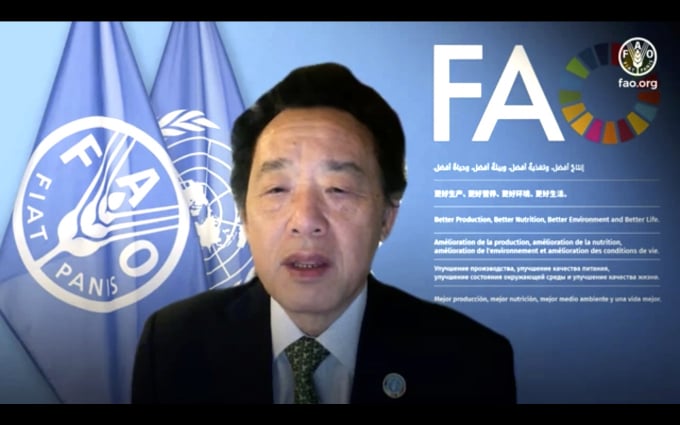October 10, 2025 | 09:20 GMT +7
October 10, 2025 | 09:20 GMT +7
Hotline: 0913.378.918
October 10, 2025 | 09:20 GMT +7
Hotline: 0913.378.918

FAO Director-General QU Dongyu delivers a virtual message at the Agriculture Ministers’ Conference - Global Forum for Food and Agriculture 2022
Reversing soil degradation is vital if we want to feed a growing global population, protect biodiversity and help address the planet’s climate crisis, the Director-General of the Food and Agriculture Organization of the United Nations (FAO), QU Dongyu, today told a meeting of agriculture ministers in Berlin.
As much as 95 percent of global food production depends on soil. However, unsustainable agricultural practices, the overexploitation of natural resources and a growing population are putting increased pressure on our soils. A third of them are already degraded, and experts estimate that soil erosion could lead to a 10 percent loss in crop production by 2050.
After oceans, soils are the largest reservoirs of carbon and play a crucial role in mitigating and adapting to the impacts of the climate crisis. The degradation of the world's soils has already released up to 78 gigatonnes of carbon into the atmosphere (one gigatonne is equivalent to the mass of 10,000 fully loaded U.S. aircraft carriers). According to the Global Soil Organic Carbon Sequestration map, soils could sequester up to 2.05 petagrams of CO2 equivalent per year, thus offsetting as much as 34 percent of greenhouse gas emissions from agricultural land.
Soils are full of life as well, holding an estimated 25% of global biodiversity.
“Our growing population requires more food that is nutritious and safe, free of contaminants and pathogens,” FAO’s Director-General told the gathering. “Countries must make stronger commitments towards sustainable soil management,” Qu added.
Over 70 agriculture ministers from around the globe were invited by their German colleague, Cem Ozdemir, to exchange thoughts and ideas at the Global Forum for Food and Agriculture (GFFA), a conference that is held each year in Berlin.
Degradation reversal
FAO’s latest State of the World’s Land and Water Resources for Food and Agriculture has already warned us that our agricultural systems – the interconnect complex web of soil, land and water - are at “breaking point.”
Soil erosion is the biggest threat. It is estimated that by 2050, soil erosion could lead to a 10 percent loss in crop production and remove 75 billion tons of soils.
Soil pollution is also an issue. It knows no borders and compromises the food we eat, the water we drink and the air we breathe. The excessive or inappropriate use of agrochemicals is one cause of the problem. The global annual production of industrial chemicals has doubled since the beginning of the 21st century, to approximately 2.3 billion tonnes, and is projected to increase by 85 percent by the end of the decade.
Another challenge comes from salinization, which affects 160 million hectares of cropland worldwide and every year renders 1.5 million hectares unproductive.
Finally, there’s a lack of reliable data. Over 55 percent of surveyed Members of the Global Soil Laboratory Network (GLOSOLAN) lack adequate analytical capacities, including human resources, harmonization procedures and equipment.
In October, FAO launched the Global Map of Salt-Affected Soils, a joint project involving 118 countries and hundreds of data-crunchers that allows experts to identify where sustainable soil management practices should be adopted and informs policy makers when dealing with climate change adaptation and irrigation projects.
More is needed
According to FAO’s Director-General, countries must make stronger commitments, while instruments such as the Voluntary Guidelines for Sustainable Soil Management, the World Soil Charter and the International Code of Conduct for the Sustainable Use and Management of Fertilizers can provide added impetus.
Greater investments - particularly for supporting the adoption of sustainable soil management practices - and the recarbonization of soils are also a priority, along with land tenure security.
The Director-General welcomed the adoption of a joint communique’ by participants representing what he described as “a reflection of your commitment to healthy soils, including protecting agricultural land through tenure security,” and said FAO would help facilitate its implementation.
“FAO, including through the Global Soil partnership, is committed to healthy soils and to supporting sustainable soil management at all levels for better production, better nutrition, a better environment and a better life for all, leaving no one behind,” Qu said.
(FAO.org)

(VAN) The people who are most vulnerable to the hard-to-breathe air that comes with climate change may inadvertently be adding to the problem, new research finds.

(VAN) Director-General QU Dongyu announces series of initiatives following global livestock conference.

(VAN) China’s freeze on U.S. soybean purchases hits a key GOP constituency in the run-up to 2026 midterm elections.

(VAN) President Xi Jinping's festive greetings ahead of the eighth Chinese Farmers' Harvest Festival, which fell on Tuesday this year, were a clear signal that China regards food security as a core strategic issue.

(VAN) BBNJ Agreement will enter into force in January.

(VAN) Demonstrations have been planned around the world this week ahead of the United Nations General Assembly and New York Climate Week.

(VAN) After years of intense deliberation, the European Commission has finally given its nod to the Mercosur and Mexico agreement.